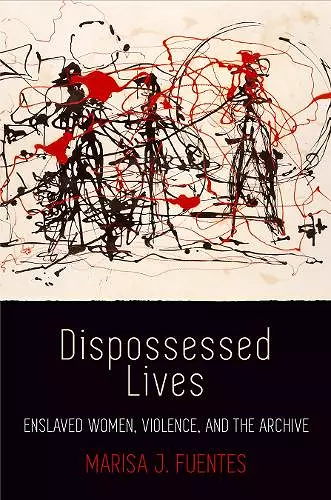Dispossessed Lives
Enslaved Women, Violence, and the Archive
Format:Paperback
Publisher:University of Pennsylvania Press
Published:12th Mar '18
Should be back in stock very soon
This paperback is available in another edition too:
- Hardback£80.00(9780812248227)

This book explores the lives of enslaved women in eighteenth-century Bridgetown, Barbados, revealing the complexities of their experiences and the power dynamics at play. Dispossessed Lives challenges historical narratives.
In the eighteenth century, Bridgetown, Barbados, was a complex society where both enslaved and free women navigated a challenging landscape. Marisa J. Fuentes offers a profound exploration of urban Caribbean slavery through the stories of these women, whose voices are often overlooked in historical narratives. By weaving together their experiences, Fuentes transports readers through the streets of Bridgetown, revealing the harsh realities faced by an enslaved runaway, the dynamics of a brothel run by a freed woman of color, and the disturbing scenes of punishment and execution that marked their lives.
Dispossessed Lives delves into the intricate relationship between power and representation, interrogating the archives that shape our understanding of the past. Fuentes employs interdisciplinary methodologies, including black feminist theory and critical historical studies, to unearth the ongoing impact of white colonial power on the narratives of these women. The book emphasizes how the construction of the historical record has not only marked enslaved women's bodies but has also obscured their stories in life and death.
Through vivid recounting and careful analysis, Fuentes challenges conventional historiography, urging readers to reconsider the ways in which histories of marginalized and often invisible subjects are constructed. By illuminating the conditions of confinement and the multifaceted power dynamics at play, Dispossessed Lives serves as a crucial contribution to the understanding of slavery and its enduring legacies.
"[A]n astonishing and discipline-changing piece of scholarship. Interested in black feminist theory, gender, sexuality, slavery, and the urban Caribbean, [Fuentes'] interdisciplinary deep dive into the archives collides with so-called conventional understandings of historical methodology, historiography, knowledge production, and especially historical archival research . . . scholars can no longer rationalize the absence of marginalized figures like the women in this book because the archival documents do not explicitly reveal them. Moreover, one will be hard pressed to tread heavily ever again over those documents-or their already fragment-rendered subjects-after reading this incredibly important work." (Journal of Early American History) "Dispossessed Lives reflects the tremendous complexity embedded in projects that attempt to extricate the histories of enslaved women from an archive seemingly bent on their erasure. Through artful discussions of the bondwomen who comprise her chapters, reading into silence as well as sound, Fuentes encourages historians to assess the limits of enslaved agency, highlighting the real, violent strictures that shaped the lives and afterlives of enslaved women residing in eighteenth-century Bridgetown. In doing so, Fuentes demonstrates what is possible when we approach familiar evidence with fresh eyes and innovative strategies." (Journal of African American History) "Dispossessed Lives is an impassioned and meticulously researched call to rethink how history, as a discipline, can approach the absence of archival evidence concerning enslaved women's lives in the Americas . . . [Fuentes] makes a compelling argument about the practice of history as a discipline itself, in addition to mapping new archival territory." (Textual Cultures) "Dispossessed Lives exemplifies the best new historical scholarship on slavery and gender. Marisa Fuentes's compelling study of women's lives in and around Bridgetown leaves the reader with a clear sense of who these women were and how they navigated the terrain of a Caribbean slave society. At the same time, Fuentes's engagement with the problems of the archive testifies to the powerful entanglements that constitute the afterlife of slavery. This is an important study that fundamentally reshapes the questions we are compelled to ask about the histories of slavery in the Atlantic world." (Jennifer L. Morgan, New York University) "Original in both content and structure, Dispossessed Lives offers a nuanced interpretation of race, gender, sexuality, and the power of the archive in the eighteenth-century urban British Atlantic. Marisa J. Fuentes is masterful with her use of extremely scarce primary source material, forcing us to rethink methodology and teaching us how to understand what is not present in the archives." (Erica Armstrong Dunbar, University of Delaware) "Dispossessed Lives is an important and complex work that demonstrates how historians can employ a range of interdisciplinary methodologies in order to tease out, in sensitive and thoughtful ways, the hidden corporeality of enslavement, or, put another way, the lives, deaths, and bodies of enslaved women that are buried in the archive." (Melanie J. Newton, University of Toronto)
ISBN: 9780812224184
Dimensions: unknown
Weight: unknown
277 pages